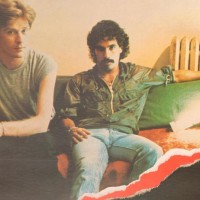Hall and Oates’ “I Can Go For That (No Can Do)” began its nearly month-long march to the top of the Billboard charts this week, creating misconceptions and breaking barriers along the way.
Released on December 14, 1981, the track — co-written by Daryl Hall, John Oates and Sara Allen — it’s perhaps most famous these days as Hall and Oates’ fourth charttopping single. But it was much more than that, having also gone to No. 1 on the dance charts and (more intriguingly) to No. 1 on the R&B charts. That led to a rare moment for a white act: Hall and Oates were invited to play Soul Train, appearing in November of 1982. In short, “I Can’t Go For That” solidified their superstar status in both musical worlds. It may have even served as the inspiration for “Billie Jean” by Michael Jackson.
Legendary TV host Don Cornelius memorably welcomed Hall and Oates as “two genuine superstars aboard the Soul Train, and two men who are among the few in history to master the art of crossing music over in the other direction.” The duo also rocked “Maneater,” which by the fall of ’82 then on its way to becoming yet another two-chart smash.
“I thought Soul Train was an amazing show that perfectly captured the R&B music of that era,” Oates tells SoulTrain.com. “Anybody who was anybody in R&B was on that show.”
And yet, “I Can’t Go For That (No Can Do)” emerged from simple origins — and, even today, continues to befuddle those who think they know just what it’s all about.
The song began with nothing more than a primitive drum track, and a scrap of a concept. But it didn’t take long for Daryl Hall and John Oates to realize they had something magical.
“We had been doing a recording session and we had recorded all day into the evening, and all of the band guys had left,” Oates tells Matt Wake of AL.com. “It was just Daryl, myself and the engineer in the studio, just kind of cleaning up a few things, and Daryl had this idea. He went and sat at this keyboard, and we had this little rhythm machine called a Roland CompuRhythm, which was an early version of a drum machine. We used it just for tempos and things like that.”
A basic rhythm track from the Roland became a leaping-off point. “It happened to be on this particular beat,” Oates adds, “and [Daryl] just started playing the left-hand bass line of that song, and he said, ‘Hey, man, get your guitar. I think I’ve got something here.'”
Oates completed their initial work with a dark, plucky riff. The next day, Hall and Oates added Charlie DeChant’s slithering saxello, a little more synth (it was the 1980s, after all) and some background vocals to the roomy groove found on the demo — and a song that would eventually be played more than one million times on the radio, as certified by BMI, was born.
“I think that’s one of the things about it: It’s so simple, and there’s so much space in it,” Oates says. “That’s what made it so funky.”
Most listeners, over all of these years, filled that space with assumptions about what “I Can’t Go For That (No Can Do)” is about: A relationship gone bad. Turns out, it doesn’t have anything to do with women, Oates tells Philly.com. “I Can’t Go For That,” he says, “is about the music business. That song is really about not being pushed around by big labels, managers and agents, and being told what to do, and being true to yourself creatively.”
Oates adds that he and Daryl Hall would often take a specific idea like that and transform it into a broader subject so that their songs together were more relatable. Clearly, listeners responded.
“That song is typical of a lot of the lyrics we’ve written over the years: It seems like it’s about one thing, but it’s really not,” John Oates says. “What we have always tried to do, and if we have any kind of philosophy for our lyrics over the years it was to try to take a universal subject and somehow make it seem personal so that people could relate to it as if it was a personal thing.”


